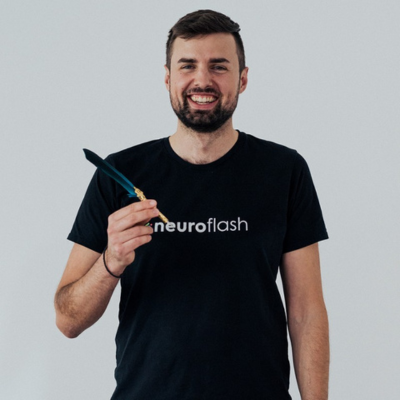Table of contents
- Henrik Roth, CMO and co-founder of neuroflash
- Manuel Weiss, Team Lead SEO and Content at OMR Reviews
- Nils Knäpper, SEO writer at OMR Reviews
- AI softwares on OMR Reviews
If you haven't been living under a rock for the past twelve months, you've probably come across one topic in particular: artificial intelligence. Our work at OMR Reviews has also been significantly changed by AI. Together with Henrik Roth, CMO of AI tool provider
neuroflash we take a look at the hype and speculate where the journey might still take us.
Henrik Roth, CMO and co-founder of neuroflash

Hello Henrik, how did you experience the hype and how did it influence your product or company development?
When we launched ContentFlash in March 2022, we offered a simple document editor equipped with pretrained prompts, with a version of GPT-3 optimized for German text quality working in the background. From March to January 2023, we experienced enormous growth and quickly became the market leader in the DACH region, with about 400,000 registered users. We continuously introduced new features almost weekly to improve our platform and at the same time provide professional marketers with valuable new tools that enable them to create content more efficiently - including SEO analysis, 1-click blog articles, and grammar checks.
OpenAI ChatGPTcame then surprisingly and unpredictably even for us. We always knew that generative AI would soon be everywhere and the pure text function would not be of much value anymore. But we wouldn't have thought it would happen so quickly.
Strategically, we completely repositioned ourselves and right after the Christmas break, we transformed our AI Writer into a professional Content Marketing Suite: The first step was ChatFlash, followed by advanced features such as an integrated plagiarism check, SEO workflows, team functions, image generation, a Chrome extension, brand voices and much more. In this way, we were then able to successfully ride the wave around generative AI. This month we reach 1 million registered users - with international origins.
What misunderstandings do you see in dealing with AI despite the hype?
A common misunderstanding is that AI can replace or mimic human thinking and creativity. In fact, AI is a tool that enhances human capabilities. We strongly believe in the "human-in-the-loop". Specifically, this means for us: The first draft comes from neuroflash. The final result, however, is a symbiosis of human and further automations by the AI.
Additionally, I often see users who think that 1 to 2 prompts and entries are enough. To properly handle generative AI and identify real value drivers requires a learning curve and takes time - but then it's a major efficiency booster.
What do you expect as an expert from future opportunities with generative AI?
The models will become more multimodal, both in terms of input and output processing. Socially, I believe that AI will change the way we humans collaborate and what our work environment will generally look like (30h week, here we come!). Future models will become agents - thus smarter by understanding which actions need to be executed next to bring the user to the best result as quickly as possible.
How do you want to position yourself in this rapidly growing market?
We will further expand our market leadership in the DACH region by offering good education offers to introduce users to this new technology. In addition, we will specialize more vertically and provide automation solutions for professional marketers in addition to pure text or image generation. Also, our interface will exactly meet the internal processes and jobs-to-be-done of our target groups. Because nobody has written great content in a chat - especially for long texts we need a text editor and documents.
In addition, we have developed our own technology in collaboration with major brands over the past 5 years that can predict content performance. Here, we will particularly offer new features for our customers in 2024.
As an entrepreneur, how do you view the much-discussed topic of AI and data protection, copyright and ethics?
This discrepancy is a big challenge - and also often asked by our users. It's important that we're transparent about how data is used and that we adhere to strict data protection standards. Because the technology is evolving so quickly, it's very difficult to find meaningful regulations. In the end, however, the opportunities and advantages of AI clearly outweigh the risks for me.
Manuel Weiss, Team Lead SEO and Content at OMR Reviews

How did you experience the AI hype?
In December 2022, my CTO Tobias Schlottke came up to me and told me to check out this ChatGPT. Supposedly it could replace all our content writers. He didn't put it that drastically, but I was incredulous that an AI could achieve such good results.
With the first ChatGPT test, the phase of enthusiasm began and I was blown away. However, this only lasted a short time; a phase of sobering quickly followed when I realized that the content looked great at first glance, but not so convincing in detail. Through further discussions and various LinkedIn posts, I then learned that the prompt is the be-all and end-all. So, you should give the AI a little more than just a one-line requirement to get meaningful results.
Nowadays, I've arrived in a realistically optimistic phase. I'm convinced that AI will shape the future, but the possibilities are (still) limited. However, with the further development in the next few years, I assume that many steps will be taken over by AI or at least strongly supported.
In everyday life, I already use AI mainly for smaller tasks or when I want a first draft on a topic. But of course, AI is also used when I have a blockage, be it for a LinkedIn post or a text for meta title and description. I don't think there's a use case that I haven't tried once. Even in employee feedback meetings, I have already used AI. I fed the artificial intelligence with all feedback points of my employees and asked it to analyze the consensus. This way, I was quickly able to identify which feedback aspects were mentioned particularly often.
What misunderstandings are there about AI?
You can't expect to type a simple prompt like "Write me a blog article about SEO tools" and the perfect article is created, because the prompt just needs to contain much more information. Just as you brief a human writer, you must also proceed with AI. Then it works quite well. I think a big misunderstanding is that AI can recognize this intention and then do everything else on its own.
How will AI develop?
I believe that AI will simply be the future. The hype about artificial intelligence, in which thousands of companies suddenly spring up, will in my opinion also decrease at some point. Many of these companies will disappear again because many cover the same use case. There will be a consolidation of the market. From the user's point of view, I believe that it will become normal for people to use AI and integrate it into their everyday processes. I think AI is such a topic that can't be overlooked.
How do you look at the discrepancy between AI and ethics, copyright and data protection?
I myself already use AI quite often and have to admit that I rarely ask myself whether or how the text was copied from somewhere else. Unfortunately, you can never trust that everything the AI says is correct, or that the contents were taken directly from somewhere else. I'm afraid that's a pain point we have to live with. It becomes difficult of course when false information is presented and you take it 1-to-1.
And in terms of data protection: Clearly, it's difficult when you work with US companies like OpenAI - if you use sensitive data in ChatGPT to get better results, you never really know what happens to them. Therefore, I would always make sure to only provide the AI with public data and not to input private things. For example, there are also people who use AI for customer mails, which may also handle sensitive data. In my opinion, each industry or department must define its own rules, what is feasible and what should not be done.
Nils Knäpper, SEO writer at OMR Reviews

How did you experience the AI hype?
I still remember what my first thought was when I tried ChatGPT for the first time: Wow, what's possible these days. My second thought was: Where's the nearest job center? Actually, the possibilities of AI excited and scared me in the beginning. As an SEO writer, I quite quickly questioned my professional existence - a concern that thankfully proved to be unfounded. Nevertheless, ChatGPT, neuroflash and co. have permanently influenced and, let's be honest, improved the way I work.
Many tasks of an SEO writer, which were necessary in the past but time-consuming, monotonous or (badly said) boring, can now be comfortably and reliably shortened with AI: Whether it's the initial research on a topic, creating an outline or sorting keyword lists.
The big hype has long since evaporated for me - on the one hand, because I simply use ChatGPT, neuroflash and co. daily and therefore know quite exactly what AI can and cannot do. This naturally demystifies the whole story a bit. Nevertheless, I am always surprised when a new update comes out and the artificial intelligences seem to have become a little bit smarter.
What misunderstandings are there about AI?
Basically, I agree with Henrik and Manuel: AI is not a "magic weapon", it is not a magic cure and also not a self-runner. AI is an admittedly powerful tool, which can simplify many aspects of work. However, it cannot (yet) replace human judgment, intuition or empathy.
How will AI develop?
I believe that AI will bring about a socially relevant change in the long term just like the Internet. The astonishing things that can already be arranged are just the tip of the iceberg of what we can achieve in 10 or 15 years with the help of artificial intelligence. As I said before, AI is a tool. And as is the case with tools, they can unfortunately be used for both sensible and malicious purposes (hello Skynet).
How do you view the discrepancy between AI and ethics, copyright and data protection?
As an SEO writer, you are of course constantly confronted with the issue of authorship. However, I think we should differentiate here: as long as the AI does not simply copy existing texts 1-to-1, I find it okay if it uses generally accessible knowledge. What I see as more problematic is when AI is used commercially to imitate music, images or the art styles of real artists. This is particularly where suitable regulations are currently lacking. Given the rapid development of AI, I also believe that it will be difficult to create long-term frameworks here. In terms of data protection, I see every individual as having a responsibility to only feed the AI with such data that they would also publicly share.
AI softwares on OMR Reviews
 Midjourney
Midjourney Conversionmaker.ai
Conversionmaker.ai Creaitor
Creaitor Retresco Textengine
Retresco Textengine Pro-Writer
Pro-Writer
